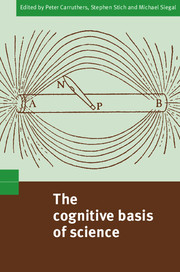Preface
Published online by Cambridge University Press: 23 November 2009
Summary
This volume is the culmination of the fourth project undertaken by Sheffield University's Hang Seng Centre for Cognitive Studies. (The first project resulted in Theories of Theories of Mind (1996), edited by Peter Carruthers and Peter K. Smith; the second resulted in Language and Thought (1998), edited by Peter Carruthers and Jill Boucher; and the third produced Evolution and the Human Mind (2000), edited by Peter Carruthers and Andrew Chamberlain; all three volumes were published by Cambridge University Press.) For the first time, however, the present project also involved co-operation with the Evolution and Higher Cognition Research Group at Rutgers University, led by Stephen Stich. Four inter-disciplinary workshops were held in Sheffield over the period 1998–2000, and two conferences took place – one at Rutgers in November 1999, and one at Sheffield in June 2000. This collaboration has enabled us to assemble a wider and more international field of contributors than would otherwise have been possible.
The intention behind the project was to bring together a select group of philosophers, psychologists and others in the cognitive sciences to address such questions as the following: What is it about human cognition which either enables us, or fits us, to do science? Do scientific abilities have some sort of distinctive innate basis? Or are scientific abilities socially constructed out of general-learning mechanisms? How do different elements of our cognition fit together to underpin scientific reasoning?
- Type
- Chapter
- Information
- The Cognitive Basis of Science , pp. xi - xiiPublisher: Cambridge University PressPrint publication year: 2002



